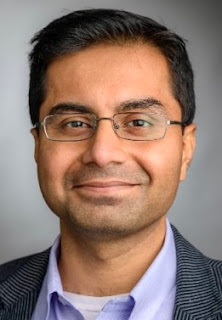Physicians have begun to feel optimistic about developing immunizations against pancreatic, colon, and breast cancers.
According to an article by Gina Kolata in today's editions of The New York Times, that report comes from early research with animals despite many doctors having given up a decade ago on the notion of finding cancer vaccines.
 |
| Dr. Sachet Shukla |
Dr. Susan Domchek, principal investigator of a breast cancer vaccine study at the University of Pennsylvania, foresees "a time when anyone with a pre-cancerous condition or a genetic predisposition to cancer could be vaccinated and protected," the piece continues.
"People would have said this is insane," she's quoted as saying. Now, "it's super-aspirational, but you've got to think big."
Kolata's story asserts that "the search for cancer vaccines started with Olivera Finn, PhD, a distinguished professor in the departments of immunology and surgery at University of Pittsburgh School of Medicine" in 1993. She began with a trial of 63 patients with Stage 4 cancer. It quickly became clear, however, "that the cancers were too far advanced for immunizations to work."
 |
| Olivera Finn, PhD |
After all, Finn notes, with the exception of rabies, no one vaccinates against an infectious disease in people who are already infected."
Now, she and a colleague at Pittsburgh, Dr. Robert Schoen, a gastroenterologist, are trying to prevent pre-cancerous colon polyps with a vaccine that worked in mice.
More information about research on diseases can be found in "Rollercoaster: How a man can survive his partner's breast cancer," a VitalityPress book that I, Woody Weingarten, aimed at male caregivers.
No comments:
Post a Comment